In a bold stand against Meta’s controversial use of copyrighted books for artificial intelligence (AI) training, authors and publishing professionals will rally outside the tech giant’s King’s Cross office in London today. This protest, which will feature high-profile authors and literary figures, is a direct response to accusations that Meta has used a notorious “shadow library”—LibGen—to train its AI models.

A Star-Studded Protest Against AI’s Exploitation of Authors’ Works
Among the writers joining the protest are best-selling novelists Kate Mosse and Tracy Chevalier, as well as poet Daljit Nagra, the former chair of the Royal Society of Literature. These figures are taking a stand against Meta’s alleged use of over 7.5 million books available in the LibGen database, a controversial collection known for hosting a vast array of copyrighted works without author permission.
The demonstration will begin at 1:30 pm at Granary Square, with protesters preparing to march towards Meta’s office. At 1:45 pm, a letter from the Society of Authors (SoA) will be hand-delivered to the company, also being sent to Meta’s headquarters in the United States.
Meta’s Alleged Use of LibGen to Train AI Raises Legal and Ethical Concerns
Earlier this year, court filings in the US revealed that Meta CEO Mark Zuckerberg allegedly approved the company’s use of LibGen’s vast library to train AI models. This discovery shocked many authors when The Atlantic published a searchable database listing the titles from LibGen, exposing that numerous works—including their own—may have been included without their consent.
Vanessa Fox O’Loughlin, chair of the Society of Authors, voiced her outrage, calling Meta’s actions “illegal, shocking, and utterly devastating for writers.” She continued, “A book can take a year or longer to write. Meta has stolen books so that their AI can reproduce creative content, potentially putting these same authors out of business.”

Meta Responds to Allegations, Claims to Respect Intellectual Property
In response to the mounting criticism, a spokesperson from Meta defended the company’s actions, asserting that it respects third-party intellectual property rights and believes its use of information to train AI models complies with existing laws. However, this statement has done little to quell the growing concerns among writers who feel their livelihoods and intellectual property are being exploited without permission or compensation.
As the protest unfolds in London, the wider publishing community watches closely, questioning the future of AI and copyright law. The outcome of this demonstration may have significant implications for how companies like Meta approach the use of copyrighted materials in their AI training processes.

The Broader Implications of AI and Copyrighted Works in the Creative Industries
The protest outside Meta’s London office marks a crucial moment in the ongoing debate over the use of AI in creative industries. Authors, poets, and other content creators are increasingly vocal about their concerns regarding how their works are used by tech companies to train AI systems without proper attribution or remuneration.

While the technology behind AI models promises advancements in creativity and productivity, the tension between AI development and intellectual property rights is growing. Writers and publishers alike are calling for clearer guidelines and protections to ensure that their creative efforts are not exploited in ways that undermine their financial security and creative integrity.
As this story continues to develop, the future of AI, copyright law, and the creative industries hangs in the balance. For now, authors and their supporters are making their voices heard, fighting for what they believe to be their right to protect their intellectual property from unauthorized use by tech giants.










